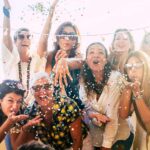In January, we celebrate a new year and a new you. It’s a great time to reset, refocus and establish the foundation for important upcoming goals. In that spirit, we would like to introduce the first-ever Pre-pregnancy Awareness Month, a month-long celebration that’s dedicated to sharing the importance of preparing your body and improving your health before becoming pregnant and to inspiring you and your reproductive partner to take control of your fertility, starting with figuring out your pre-pregnancy wellness baseline.
Pre-Pregnancy Awareness Month is an annual holiday created by Poplin, the first pre-pregnancy wellness company for couples. Pre-pregnancy wellness is the state of your health prior to getting pregnant (usually 1 year beforehand) that influences your fertility and the health of your future pregnancy and baby. Understanding your pre-pregnancy wellness is important because healthier parents give birth to healthier babies. Because of this, experts agree that the optimal time for couples to improve their health is before becoming pregnant.
Poplin was founded because they believed the collective approach to fertility was insufficient. Fertility is often only addressed in the context of infertility, which can be incredibly physically, emotionally, and financially draining. There had to be a better way.
What if we prepared for pregnancy like we prepare for any other major milestone, such as a wedding — in advance, with targeted tools, guidance, and support?
“Pre-pregnancy preparation is a process, not a single intervention” – Poplin.
Optimal pre-pregnancy preparation involves more than stopping birth control or taking a prenatal vitamin. It has many steps and starts with figuring out your unique starting point through pre-pregnancy wellness testing. Pre-pregnancy wellness testing looks beyond hormones to assess your whole health. Poplin’s test panels allow you to dive deep into your health across five comprehensive categories: Blood Type & Status, Immune Status, Hormone Status, Metabolic Status, and Nutrient Status. This comprehensive look at your health will help you identify any red or yellow flags that could interfere with your ability to get pregnant and have a healthy baby. Fertility doesn’t have to be a black box anymore.
Pre-Pregnancy Awareness Month is the time to figure out your pre-pregnancy wellness baseline, so you know what you are working with. As a result, you will be able to identify specific areas of improvement and start taking the necessary steps to enhance your overall health and fertility.
History of National Pre-Pregnancy Awareness Month
The concept of “pre-conception care” made an early appearance in a federal position paper in 1979 and later made its way into guidelines in 1983, suggesting the need to change the approach to pregnancy from reaction to prevention. To know more about the origins of the pre-pregnancy wellness movement, head to the timeline below!
From 1979 to the present, there have been several clinical guidelines established by leading medical organizations, but preconception care is still only accessed by <20% of the population. This is entirely unacceptable! Poplin was founded to fill this gap in care.
Poplin created the concept of “pre-pregnancy wellness” to modernize and streamline the approach to preconception care as well as to expand access to all couples hoping to conceive. Poplin empowers couples to take control of their pre-pregnancy journey with a step-by-step preparation process, starting with the most comprehensive pre-pregnancy wellness lab testing available on the market.
“In my years spent as a clinical nutritionist, I worked with hundreds of clients across the spectrum of conception — those preparing, those trying, and those struggling. I realized that the earlier we start, the better the outcomes and the experience for everyone involved. Poplin was born to demystify the preconception process. Preconception starts the moment you decide you want to become a parent. The first step on the preconception journey is figuring out your unique starting point through targeted Pre-Pregnancy Wellness Testing. From there, we can help guide you on your unique journey to becoming the healthiest version of yourself — for you, your partner, and your future family.” – Poplin’s Founder, Alexandria DeVito
National Pre-Pregnancy Awareness Month timeline
The American Academy of Pediatrics (AAP) and the American College of Obstetrics and Gynecologists (ACOG), in partnership with the March of Dimes Birth Defects Foundation, published the first guidelines saying that “Preparation for parenthood should begin prior to conception. At the time of conception, the couple should be in optimal physical health and emotionally prepared for parenthood.”
The U.S. appointed a committee, The Expert Panel on the Content of Prenatal Care, and endorsed pre-conception health, recommending that the pre-conception visit may be the most important health care visit regarding its effect on pregnancy.
The Healthy People initiative by the CDC cataloged pre-conception care as a standard expectation within the healthcare system. It called for professional standards and structures to ensure annual pre-conception visits for every woman. The initiative stressed that reproductive awareness is not sex or gender specific. Reaching out to males requires thoughtful and innovative strategies, especially during the pre-conception and interconception periods.
Despite efforts made by the ACOG and the CDC, little action took place. Standards were not set or routinely available. Years after the first guidelines are published, less than 20% of females receive access to pre-conception care.
Poplin fills the gap in pre-conception care by founding a new category in health & wellness and establishing a new standard of care for fertility, starting with Pre-pregnancy Wellness Testing.
This month-long celebration is dedicated to inspiring you and your reproductive partner to take control of your fertility health, prepare your body and improve your health before becoming pregnant. Healthier parents conceive healthier babies!
National Pre-Pregnancy Awareness Month FAQs
What is pre-pregnancy wellness?
The term “Pre-pregnancy wellness” is the newest kid on the wellness block. Pre-pregnancy wellness is the state of your health immediately before getting pregnant (usually 1 year before) that influences your fertility and the health of your future pregnancy and baby. Pre-pregnancy wellness status is important for both females and males hoping to conceive.
When should I get pre-pregnancy testing?
Poplin recommends starting your pre-pregnancy journey 12 months before you desire to get pregnant. Upgrading your health takes time — correcting abnormalities sometimes takes up to 3-6 months or more, depending on what testing reveals.
Who pre-pregnancy tests are for?
Any female or male who desires to become pregnant in the next ~12 months. Pre-pregnancy tests are relevant for first-time pregnancies as well as subsequent pregnancies. In addition, pre-pregnancy tests can be helpful for anyone preparing for an assisted reproductive procedure (e.g., egg freezing, IUI, IVF).
Are pre-pregnancy tests the same as fertility tests?
Nope! A pre-pregnancy test will help you evaluate your whole health before you try to get pregnant; these tests are relevant for anyone who wants to become a parent one day.
On the other hand, fertility tests often focus on hormone levels and are usually only recommended when you have difficulties conceiving. These tests are not relevant for everyone.
How to Start Your Journey with Poplin
Order your test package online
We know you’re busy, so let’s make it simple! You can start your journey in less than 5 minutes by selecting one of Poplin’s Pre-Pregnancy Wellness Tests.
Get your labs done
You can select to have your blood drawn at a local lab or in the comfort of your home with mobile phlebotomy. Either way, it’s quick and efficient!
View your personalized results
Once your results are ready, you will receive a detailed report that outlines your pre-pregnancy wellness status. Each biomarker result will include an explanation of what it is and why it is relevant for fertility and pregnancy.
Schedule your educational call
Once you have reviewed your test results, you can schedule a one-on-one educational call with our pre-pregnancy experts. This call will help you better understand your results and determine the best next steps for your pre-pregnancy journey.
5 Surprising Facts About Pre-Pregnancy
Toxins can contribute to fertility challenges
The State of Preconception Planning in America 2022 report showed that 30% of females surveyed had significant daily toxin exposures. This can include food and water, personal care products (e.g., shampoo, lotion) or home care products (e.g., detergent). A key part of pre-pregnancy preparation is reducing toxin exposures and increasing detoxification capacity.
Being either underweight or overweight can negatively impact fertility
Weight can play a role in fertility. Being underweight can indicate that you are undernourished and can be responsible for insufficient hormone levels to sustain a pregnancy. Being overweight can indicate metabolic dysfunction and elevated hormone levels, which can interfere with conception and pregnancy. In both cases, pre-pregnancy wellness testing can help provide deeper insight into what’s going on in your unique body and whether it will be important to modulate your weight before conceiving (e.g., due to elevated inflammation levels or blood sugar levels or hormone levels, etc.).
Sex and stress are incompatible
Did you know that 60% of females perceive stress as a leading factor affecting their ability to get pregnant? And nearly 70% of females reported being moderately to severely stressed (The State of Preconception Planning in America, 2022). This is important because your sex hormones and your stress hormones are in the same biochemical pathway. Chronic stress can cause your body to divert resources from making sex hormones to making stress hormones, which can impact your ability to conceive.
Your pre-conception journey starts at least 12 months in advance
Starting 12 months before you desire to become pregnant will give you time to correct any abnormalities that might be detected on your tests. This way, you’ll be in peak health when you start trying! Healthier parents = healthier babies.
Egg quality is more important than egg quantity
According to Poplin’s Preconception Planning report, for 95% of females, egg quantity is essentially irrelevant when it comes to conceiving. Diminished ovarian reserve only affects ~5% of females under 35. Focusing on egg quality instead of egg quantity is a more effective strategy as egg quality is largely modifiable through diet, lifestyle and supplementation at any reproductive age.
How to Celebrate Pre-Pregnancy Awareness Month
Get tested and start your Pre-pregnancy Wellness journey!
Poplin makes it easy for you to start your pre-pregnancy wellness journey. All you need to do is order your preferred test panel and take the lab test at your convenience, either with a blood draw at a local lab or in the comfort of your own home with mobile phlebotomy. Visit the website to create an account and select your panel today!
Encourage your reproductive partner to get tested too!
Pre-pregnancy wellness is relevant for both females and males. We encourage you to get your reproductive partner involved in the pre-pregnancy process too! Approaching your fertility health as a reproductive couple is a more effective family planning strategy. Collectively, you can identify risks and potential issues in both partners/donors giving you an abundance of information before you get to the intervention stage.
Talk to your friends and family
According to Poplin’s 2022 report, ‘The State of Preconception Planning in America,’ 97% of females surveyed were not optimally prepared for pregnancy. It’s time to spread the word about the importance of pre-pregnancy wellness - both for getting pregnant and having a healthy pregnancy!
National Pre-Pregnancy Awareness Month dates
| Year | Date | Day |
|---|---|---|
| 2025 | January 1 | Wednesday |
| 2026 | January 1 | Thursday |
| 2027 | January 1 | Friday |
| 2028 | January 1 | Saturday |
| 2029 | January 1 | Monday |
















































































































